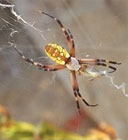

West
African Folk-Tales
by William H. Barker and Cecilia Sinclair
How
We Got the Name "Spider Tales"
How
Wisdom Became the Property of the Human Race
Why
the Lizard Moves His Head Up and Down
Why
White Ants Always Harm Man's Property
Why We See Ants Carrying Bundles As Big As Themselves
Why Spiders Are Always Found in Corners of Ceilings
Anansi
and the Blind Fisherman
The
Grinding-Stone That Ground Flour By Itself
Why the Sea-turtle When Caught Beats Its Breast With Its Forelegs
How
Beasts and Serpents Came into the World
Why the Moon and the Stars Receive Their Light From the Sun
How
the Tortoise Got Its Shell
The
Hunter and the Tortoise
Why the Leopard Can Only Catch Prey On Its Left Side
King
Chameleon and the Animals
To Lose an Elephant For the Sake of a Wren Is a Very Foolish Thing To Do
Why Tigers Never Attack Men Unless They Are Provoked
The Hunter and the Tortoise
A VILLAGE hunter had one day gone farther afield than usual. Coming to a part of the forest with which he was unacquainted, he was astonished to hear a voice singing. He listened; this was the song:
"It is man who forces himself on things,
Not things which force themselves on him."
The singing was accompanied by sweet music—which entirely charmed the hunter's heart.
When the little song was finished, the hunter peeped through the branches to see who the singer could be. Imagine his amazement when he found it was none other than a tortoise, with a tiny harp slung in front of her. Never had he seen such a marvellous thing.
Time after time he returned to the same place in order to listen to this wonderful creature. At last he persuaded her to let him carry her back to his hut, that he might enjoy her singing daily in comfort. This she permitted, only on the understanding that she sang to him alone.
The hunter did not rest long content with this arrangement, however. Soon he began to wish that he could show off this wonderful tortoise to all the world, and thereby thought he would gain great honour. He told the secret, first to one, then to another, until finally it reached the ears of the chief himself. The hunter was commanded to come and tell his tale before the Assembly. When, however, he described the tortoise who sang and played on, the harp, the people shouted in scorn. They refused to believe him.
At last he said, "If I do not speak truth, I give you leave to kill me. To-morrow I will bring the tortoise to this place and you may all hear her. If she cannot do as I say, I am willing to die." "Good," replied the people, "and if the tortoise can do as you say, we give you leave to punish us in any way you choose."
The matter being then settled, the hunter returned home, well pleased with the prospect. As soon as the morrow dawned, he carried tortoise and harp down to the Assembly Place—where a table had been placed ready for her. Every one gathered round to listen. But no song came. The people were very patient, and quite willing to give both tortoise and hunter a chance. Hours went by, and, to the hunter's dismay and shame, the tortoise remained mute. He tried every means in his power to coax her to sing, but in vain. The people at first whispered, then spoke outright, in scorn of the boaster and his claims.
Night came on and brought with it the hunter's doom. As the last ray of the setting sun faded, he was beheaded. The instant this had happened the tortoise spoke. The people looked at one another in troubled wonder: "Our brother spoke truth, then, and we have killed him." The tortoise, however, went on to explain. "He brought his punishment on himself. I led a happy life in the forest, singing my little song. He was not content to come and listen to me, He had to tell my secret (which did not at all concern him) to all the world. Had he not tried to make a show of me this would never have happened."
"It is man who forces himself on things,
Not things which force themselves on him."
The text came from:
Barker,
William H.
and Cecilia Sinclair. West African Folk-tales. Lagos, Africa: Bookshop, 1917.
Amazon.com:
Buy the book in paperback.
©Heidi
Anne Heiner, SurLaLune Fairy Tales
E-mail: surlalune@aol.com
Page last updated September 5, 2006
www.surlalunefairytales.com









